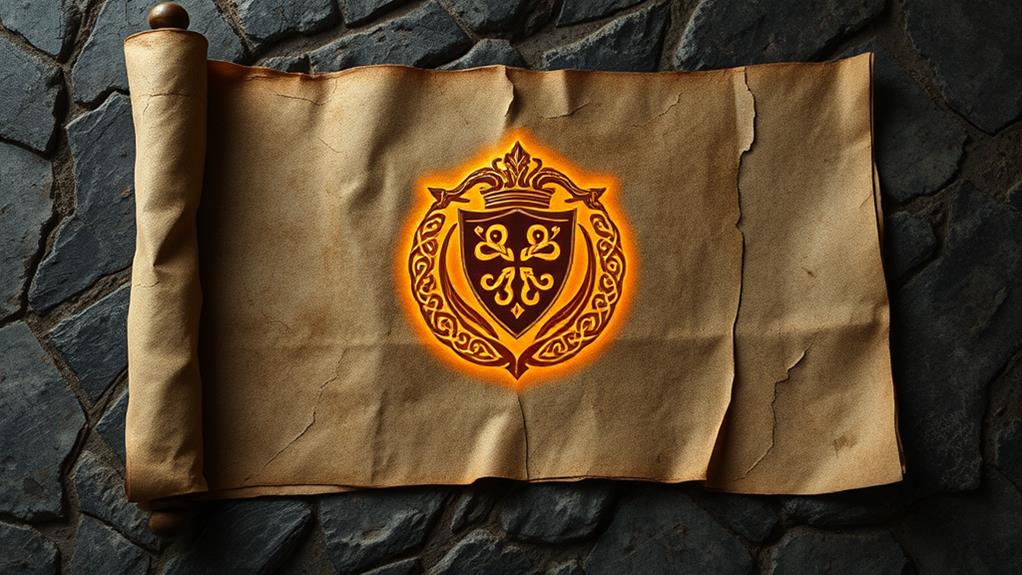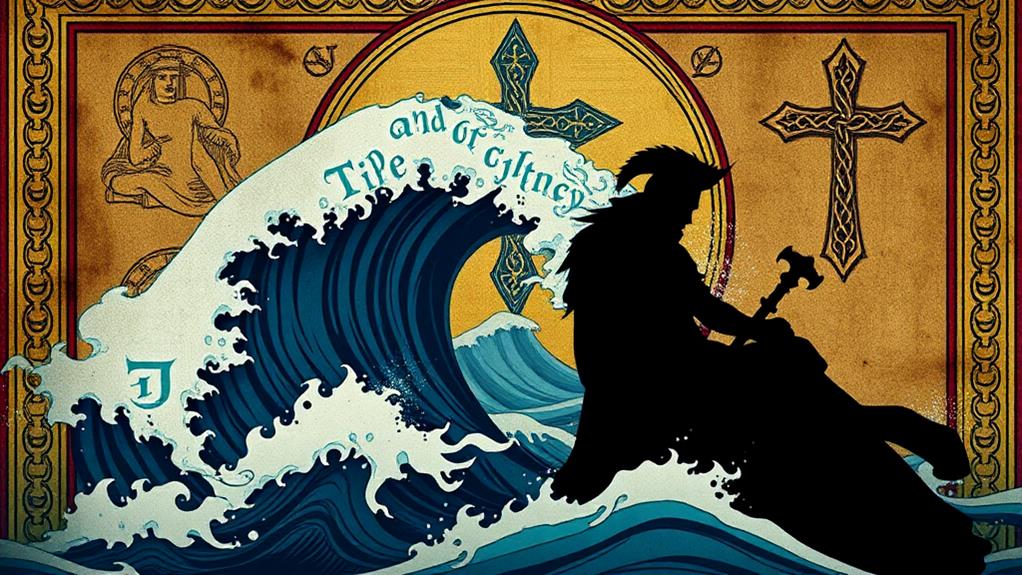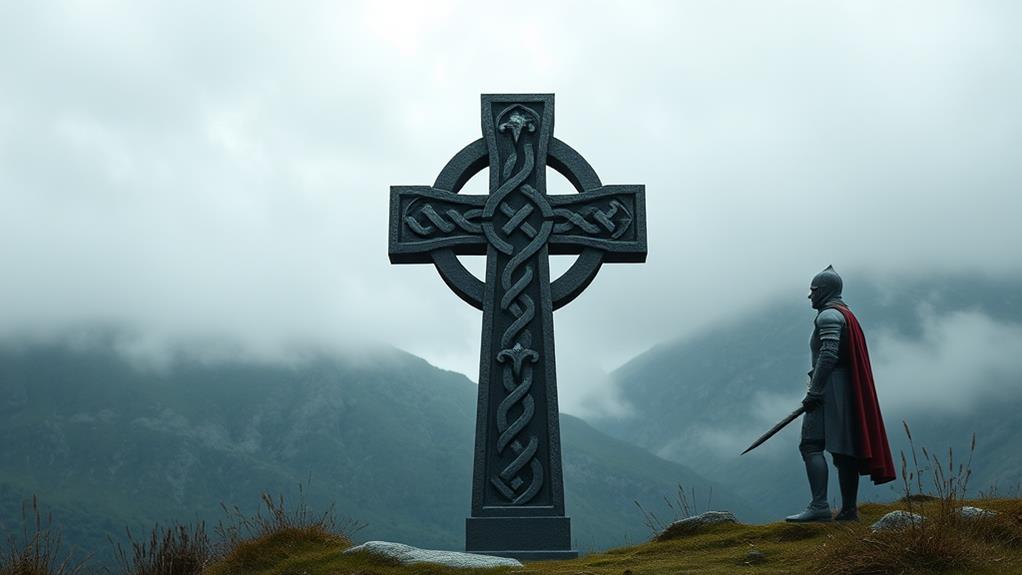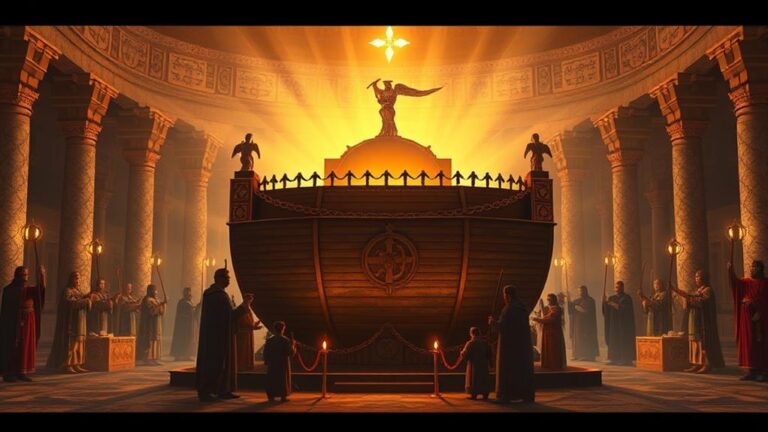Tristan Name Meaning in the Bible
Tristan’s name meaning is primarily rooted in Welsh and Celtic traditions, not having a direct biblical origin. Derived from the Brythonic word *drust*, it signifies “noise” or “tumult”. However, its prominence comes from its association with the legendary tale of Tristan and Iseult, a tragic love story that explores themes of love, loyalty, and the human condition. The name Tristan has been influenced by French and Latin, contributing meanings of “sad” or “sorrowful”. Exploring the historical and cultural context of Tristan reveals rich symbolism and spiritual significance, inviting deeper examination of its themes and influences.
Key Takeaways
- Tristan lacks direct biblical reference, with origins primarily in Welsh and Celtic traditions rather than in biblical texts.
- Derived from the Brythonic word *drust*, Tristan means “noise” or “tumult,” influenced by French and Latin factors.
- Tristan in Christian tradition is associated with Celtic and Welsh origins, symbolizing love, sacrifice, and sorrow through Arthurian legend.
- Influence from French word *triste* implies meanings of “sad” or “sorrowful,” creating thematic parallels with biblical tales of love and tragedy.
- Historical context shows Tristan gained popularity through the legendary character in Arthurian folklore, reflecting historical significance in Western literature.
Biblical Origins of Tristan

The name Tristan does not have direct biblical origins. Its roots are primarily found in Welsh and Celtic traditions, with the earliest known forms of the name derived from the Brythonic word *drust*, meaning “noise” or “tumult”.
The name gained prominence through its association with the legend of Tristan and Iseult, a famous tale from medieval European literature.
In terms of religious symbolism, Tristan’s connection to the Arthurian legend and its motifs of chivalry and tragic love can be seen as reflecting on broader themes of human morality and ethical dilemmas. However, these themes are not specific to biblical contexts but rather represent a broader cultural and historical context.
Historically, the name Tristan has been influenced by various cultural and linguistic factors, including French and Latin, which have shaped its meaning and usage over time.
Despite its rich history and symbolism, Tristan remains a name with Celtic and Arthurian origins, lacking direct ties to biblical narratives or motifs. This understanding underscores the importance of considering the broader cultural landscape when examining the origins and meanings of names.
Spiritual Significance of Tristan
In this scenario, the name Tristan may symbolize a journey of self-discovery and perseverance, echoing the tragic tale of Tristan and Iseult, where love and loyalty are tested against the backdrop of adversity. This narrative serves as a metaphor for the spiritual journey, where one must navigate through challenges to reach enlightenment or spiritual fulfillment.
Like Logan, the name Tristan embodies resilience and faith, reminding us of the importance of relying on divine guidance during difficult times valleys symbolize hardship.
The spiritual significance of Tristan in this case lies in its ability to inspire resilience and hope, encouraging individuals to embrace their challenges as opportunities for spiritual development. By embracing this symbolic connection, one can find strength in the face of adversity, embodying the essence of Tristan’s enduring spirit.
Symbolism Behind Tristan

To explore the symbolism behind Tristan, consider how this name intertwines various threads of meaning to create a rich tapestry of symbols. Although Tristan does not have a direct biblical origin, its literary and mythological connections provide a depth of symbolism that resonates with spiritual representation. Like the name Evelyn, which embodies virtues of strength and renewal, Tristan also reflects themes of hope and resilience in the face of life’s challenges, emphasizing the importance of inner beauty and divine purpose symbolizes new beginnings.
- Mythological Essence: Tristan is deeply rooted in Arthurian legend, symbolizing a knight known for his tragic love affair, which conveys themes of human vulnerability and the complexity of love.
- Celtic Influence: Derived from the Welsh *drust*, the name Tristan also embodies the concept of “noise” or “tumult,” reflecting the chaos and turmoil that can accompany human experience.
- Literary Impact: The character of Tristan in literature often serves as a metaphor for the human condition, grappling with the duality of loyalty and love.
- Symbolic Versatility: The name Tristan has been used to symbolize both courage and sadness, reflecting the nuanced nature of human emotions.
- Spiritual Reflection: While not directly biblical, Tristan’s various connotations invite reflection on the spiritual dimensions of love, loyalty, and the human condition.
Understanding these layers of symbolism enhances our appreciation for the name Tristan as a complex and multifaceted identifier.
Tristan in Christian Tradition
The name Tristan, while rich in Celtic and Welsh origins, does not have a direct biblical reference in the traditional sense. In Christian tradition, the name Tristan is often associated with its use in medieval literature, particularly in the tragic love story of Tristan and Iseult, a knight of the Round Table in Arthurian legend, symbolizing themes of love, sacrifice, and sorrow.
This narrative intertwining of literary and historical elements underscores the name’s broader cultural significance rather than a specific biblical origin.
Tristan’s Biblical Roots
Tristan’s Biblical Roots (Tristan in Christian Tradition)
Key points about Tristan’s roots and biblical connections:
- Celtic Origins: The name Tristan is derived from Welsh and Celtic influences, specifically from the word *drust*, meaning “noise” or “tumult”. This notion of tumult can be seen as reflecting the themes of courage and resilience found in biblical narratives.
- Medieval Legends: Tristan is a central character in Arthurian legend, particularly in the tragic love story of Tristan and Iseult, which has been a part of Christian literary tradition.
- French Influence: The French word *triste* also contributes to the name’s meaning, translating to “sad” or “melancholy”.
- Biblical Analogies: While not directly mentioned in the Bible, Tristan’s story shares thematic parallels with biblical tales of love and tragedy.
- Cultural Adaptation: Tristan has been adapted in various Christian and literary contexts, reflecting its versatility and enduring appeal.
Understanding Tristan’s origins and its intertwining with Christian traditions provides a nuanced view of this complex name.
Christian Interpretations Explained**
In delving deeper into Christian Interpretations Explained regarding Tristan in Christian tradition, it becomes clear that while the name Tristan lacks direct biblical roots, its rich historical context and thematic parallels in Arthurian legend offer insights into its Christian literary significance. The name Tristan, influenced by the French word “triste” and Welsh/Cornish/Breton “trist,” encapsulates meanings of “noise,” “bold,” “sad,” or “sorrowful,” which resonate with Christian themes of suffering and redemption.
Much like the name Robert, which symbolizes strength and leadership, Tristan’s narrative embodies resilience in the face of adversity, reflecting the spiritual qualities of courage and purpose found within biblical contexts symbolizes strength and courage.
From a Christian perspective, Tristan’s narrative in Arthurian lore can be seen as a metaphor for spiritual struggle and the quest for moral purity. His tragic love story with Iseult, symbolizing the conflict between desire and duty, echoes biblical tales of love, sacrifice, and the human condition.
While Tristan is not a biblical name per se, its themes and symbolism align with Christian teachings on love, fidelity, and the impermanence of earthly attachments. Understanding Tristan through the lens of Christian interpretations provides a nuanced appreciation of its cultural and spiritual significance in Western literature. This exploration underscores the importance of biblical symbolism in interpreting names and their narratives, even when those names are not explicitly mentioned in the Bible.
Historical Context of Tristan

The name Tristan, commonly associated with Christian and Celtic traditions, does not have a direct origin in the Bible.
Historically, the name Tristan is derived from the Welsh word *drust*, meaning “noise” or “tumult,” and was influenced by the French word *triste*, implying “sad” or “sorrowful.”
This namesake gained popularity through the legendary character Tristan from Arthurian folklore, underscoring its historical significance in Western literary and cultural contexts.
Origin and Etymology
While Tristan is often associated with medieval European folklore, particularly in the legend of Tristan and Iseult, its etymological roots are less directly linked to the Bible.
The name Tristan owes its origins more to Celtic and Welsh traditions than to biblical sources. Here are key points about the etymology and historical context of Tristan:
- Celtic Roots: The name Tristan is derived from the Welsh word *drust*, meaning “noise” or “tumult,” which was later influenced by the French word *triste*, meaning “sad” or “sorrowful.”
- Brythonic Origins: The name Tristan is also linked to the Brythonic name Drust or Drustanus, reflecting a connection to ancient Celtic culture.
- Medieval Literature: The popularity of the name Tristan was considerably influenced by medieval literature, particularly the legend of Tristan and Iseult.
- Linguistic Evolution: The name Tristan has undergone linguistic transformations over time, resulting in various spellings such as Tristram and Tristen.
- Historical Usage: Tristan has been used in various historical contexts, including Arthurian legends and the names of notable figures in medieval history.
The name Tristan, while having deep historical roots, does not have direct biblical connections. Its significance and usage stem primarily from Celtic and European folklore.
Biblical References
Despite the rich historical and etymological context provided by Celtic and Welsh traditions, Tristan does not have a direct connection to biblical references. The name Tristan, with its origins rooted in Welsh and Old Brythonic, is more closely associated with Arthurian legends than biblical stories. Its symbolic associations are tied to the themes of love, sorrow, and heroism, as exemplified by the tragic tale of Tristan and Iseult, rather than any scriptural narratives.
The name Tristan does not appear in the Bible, and its meanings, such as “noise,” “tumult,” “sad,” or “sorrowful,” are derived from Welsh and French influences rather than biblical texts. While Tristan may evoke certain emotional and thematic resonances with biblical stories, it does not possess a direct biblical reference. In discussing the name Tristan within a religious context, it is essential to clarify its extrabiblical origins and meaning to avoid any misunderstanding or misinterpretation of its significance.
Tristan’s etymological roots are firmly planted in Celtic and Welsh traditions, with its modern usage reflecting a blend of medieval and contemporary influences. This understanding provides a clear perspective on the name Tristan, free from any biblically derived interpretations.
Historical Significance**
Historical background is crucial in comprehending the name Tristan. The name Tristan has a rich and diverse history that spans across multiple cultures and languages. To grasp the full depth of its significance, it is imperative to explore both its origins and its biblical interpretations.
Some key points to take into account include:
- Welsh and Old Brythonic Roots: The name Tristan is derived from Welsh *drust*, meaning “noise” or “tumult”, and influenced by the French word *triste* and Welsh/Cornish/Breton *trist*, meaning “bold” or “sad”, “sorrowful”.
- Arthurian Folklore: Tristan is a legendary character in Arthurian folklore, known for his tragic love affair with Iseult.
- French and Celtic Origins: The name Tristan has Celtic origins and is influenced by the French word *triste*, reflecting themes of sadness and melancholy.
- Biblical Interpretations: While Tristan is not a name with direct biblical origins, its meanings in various contexts highlight its versatility and cultural significance.
- Historical Figures: The name Tristan has been associated with various historical figures and literary characters, further enriching its historical context.
Tristan’s Meaning in Scripture
In Christian interpretation, names are often viewed as carrying spiritual significance, reflecting the character or destiny of the individual. While Tristan does not have a specific biblical meaning, its symbolic undertones of sorrow and melancholy could be seen as aligning with Christian themes of suffering and redemption.
However, it is essential to note that the name Tristan is primarily secular in origin and does not carry a direct religious or biblical significance. Its meaning and symbolism are rooted in cultural and literary traditions rather than scriptural texts.
Cultural Influence of Tristan

- Arthurian Legend: Tristan’s character in medieval tales of King Arthur and the Knights of the Round Table has minimized its Welsh origins and amplified its French influences.
- Literary Adaptations: Works such as Laurence Sterne’s *Tristram Shandy* and Richard Wagner’s opera *Tristan und Isolde* have further solidified the name’s cultural impact.
- Film and Television: The name Tristan has been featured in numerous films and TV series, including *Tristan & Isolde* and *Stardust*, contributing to its modern popularity.
- Historical Figures: Individuals like Tristan l’Hermite and Tristan de Clermont have added historical depth to the name.
- Global Usage: Today, Tristan is used in many countries, including Belgium, France, Iceland, Netherlands, Poland, Slovenia, and Spain, reflecting its enduring cultural significance.
This blend of literary, historical, and cultural influences underscores the name Tristan’s profound cultural impact and its continued modern relevance. Its global popularity is a demonstration of its enduring appeal.
Tristan’s Religious Significance**
Despite its extensive use in various cultures, Tristan’s religious importance is noticeably minimal in direct biblical references. The name Tristan primarily originates from Welsh and Old Brythonic roots, meaning “noise” or “tumult,” and has been influenced by French, leading to additional interpretations such as “sad” or “sorrowful”.
However, when exploring Christian interpretations and historical context related to the Bible, direct connections are scarce. In Christian and broader cultural contexts, Tristan is often associated with Arthurian legend, where Tristan, a knight of the round table, symbolizes tragic love and sacrifice.
While these narratives carry religious symbolism, they are rooted more in medieval folklore than direct biblical references. Historically, the name Tristan has been popularized through various literary and artistic works, but its biblical roots are indirect and more aligned with medieval Christian influences rather than Old or New Covenant sources.
As a result, while Tristan holds significant cultural and symbolic weight, its religious importance in the context of direct biblical references remains limited. This highlights the importance of understanding the historical and cultural contexts in which names and their meanings evolve.
Frequently Asked Questions
Is Tristan a Unisex Name in Modern Usage?
Tristan, while traditionally masculine, exhibits emerging gender neutrality due to its increasing use across genders in modern naming trends. Cultural significance, influenced by medieval legends like “Tristan and Iseult,” also shapes its usage, reflecting broader shifts towards more inclusive naming practices.
What Is the Origin of the Name Tristan Outside Biblical Context?
In the tapestry of ancient lore, Tristan’s origin unfolds with Celtic flair, symbolizing ‘sadness’ and ‘melancholy’. This name, steeped in cultural significance, has undergone a historical evolution through the legendary tales of the medieval Arthurian era and the French word ‘triste’, transcending centuries to become a timeless, versatile choice.
How Popular Is the Name Tristan in Recent Years?
The name Tristan has experienced fluctuating popularity recently, ranking #253 for boys in 2023, according to the SSA, and showing minimal usage for girls. Despite its cultural significance, its gender neutrality has not greatly impacted broader naming trends.
Are There Famous People With the Name Tristan?
Notable individuals with the name Tristan include Tristan Thompson, the Canadian NBA player who won a championship with the Cleveland Cavaliers in 2016, and the legendary protagonists of the famous medieval love story, Tristan and Isolde.
Does Tristan Have Variations in Different Languages?
Notably, Tristan has been a top 1000 name in the US since 1971. Culturally significant, Tristan has variations in over 30 languages, reflecting its historical evolution and regional adaptations. These linguistic connections include Tristán in Spanish, Tristão in Portuguese, and others, showcasing its diverse cultural significance.
Conclusion
The name Tristan does not have direct origins in the Bible. The meaning of Tristan is derived from Celtic and Welsh roots, with associations to “noise,” “tumult,” and “sadness” or “melancholy” due to its influence from the French word *triste* and the legend of Tristan and Iseult.
The spiritual significance of Tristan is not embedded in Christian tradition in the form of biblical texts. Instead, it is deeply rooted in the legend of Tristan and Iseult, which has had a profound impact on Western culture since the Middle Ages.
Historical context reveals that Tristan became popular in the United States after it was featured in various media, including the 1994 film *Legends of the Fall* and other literary and cinematic works.
An interesting statistic indicates that Tristan is more commonly used as a masculine name, with only about 15% of newborn Tristans being female, highlighting its primarily male usage.
Biblical Names of Strength and Faith
- Eleazar Name Meaning in the Bible
- Hannah Name Meaning in the Bible
- Huldah Name Meaning in the Bible
- Taliyah Name Meaning in the Bible
- Tristan Name Meaning in the Bible
Conclusion:
Tristan is a name with Celtic and Welsh origins, meaning “noise,” “tumult,” or “sadness/melancholy.” It lacks direct biblical references, instead drawing significance from medieval legends and cultural influences. Despite varying spellings, Tristan remains a popular choice for newborns, particularly for boys. Its enduring appeal is underscored by consistent inclusion in the top 1000 US baby names since 1971, reflecting a lasting cultural imprint.






